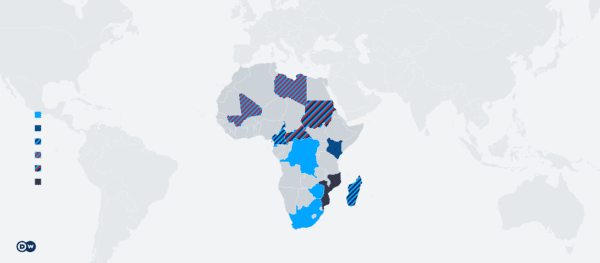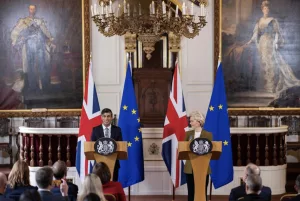On March 1, 2023, French President Emmanuel Macron embarked on his 18th tour of Africa since his first election in 2017. The week-long tour saw him visit four Central African nations, namely Congo, Gabon, Angola, and the Congo Republic. The tour kicked off with his arrival in the capital of Libreville, Gabon, before proceeding to Angola. The purpose of this tour, according to Paris, was to achieve diplomatic objectives and foster a new “responsible relationship” with the African continent.
What are Macron’s reasons behind this week-long visit?
Given the increasing influence of Russia and China in the African continent, Macron’s recent visit to Africa has raised speculation about his motive. The tour comes at a time of growing anti-French sentiments in African countries, which has led to France’s military being expelled from several countries.
Tensions reached a new high when Burkina Faso, a former French colony, asked French troops to leave their country and renounced a 1961 agreement that provided a legal basis for French military aid. The move came just one week before Macron’s tour began, and the reason for ending the agreement was explained by Burkina Faso’s foreign ministry. The Sahelian nation has given a one-month notice for “the final departure of all French military personnel serving in Burkinabe military administrations.” France’s military has previously been asked to leave Mali and the Central African Republic. Paris fears other countries such as Chad and Niger could be next.
The already strained relations between Burkina Faso and France have been further aggravated by the coup led by Captain Ibrahim Traore last year. At the time, Traore lacked support from senior officers and had to rely on gaining popular support. To achieve this, he resorted to using state television to propagate the idea that former leader Paul-Henri Sandaogo Damiba was a mere puppet of France. According to Traore, Damiba was hiding at Kamboinsin, a French base, and was planning a counteroffensive with French assistance.
This anti-French sentiment has deeper roots, as the population is disillusioned with the French troops’ inability to effectively combat terrorist groups. This frustration was highlighted on January 18, when Burkina Faso demanded France withdraw its ambassador, Luc Hallade, after he made comments about the country’s security problems. Hallade was subsequently pulled out “for consultations.” Macron’s trip to Africa, therefore, is an attempt to repair France’s damaged relations with its former colonies and to reassert its influence in the region.
The rising influence of Russia in the region
As aforementioned, there is a growing anti-French sentiment which is increasing among many African nations. Consequently, Russia has been making moves to strengthen its ties with various African states through a number of initiatives. One of these initiatives is the use of the Russian mercenary group, the Wagner Group.
In 2014, a mercenary group was established and christened with the moniker of renowned German composer, Richard Wagner. As of February 2023, the group has amassed a force of 1,890 members operating in the Central African Republic. Additionally, it’s believed that around 1,200 Wagner mercenaries are currently engaged in combat alongside rebel leader Khalifa Hifter in Libya.

Image by The Global Initiative against Transnational Organized Crime, February 2023.
Another method, which has been more recently employed, involves the distribution of Russian fertilizer to African nations in need. In a recent ceremony held in Malawi, farmers were seen rising to their feet out of respect for their Russian guests who had donated 20,000 tons of fertilizer. The bags of nitrogen, phosphate and potassium (NPK) were eagerly collected by the farmers who were in desperate need of these essential fertilizers. The global fertilizer shortage and rising prices since 2020 have been compounded by the ongoing Russia-Ukraine war.
These recent moves by Russia indicate a growing interest in strengthening its relationship with African nations and providing support to those in need. As the world faces ongoing challenges, such initiatives may become increasingly important in the years to come.
What are the benefits for Russia?
In recent years, the Wagner Group has emerged as a powerful force in Russia’s military and political landscape, with its reach extending far beyond the country’s borders. One of the group’s most visible benefits has been its ability to foster alliances with other nations.
For example, in the United Nations’ most recent resolution against Russia’s war of aggression in Ukraine, Moscow was able to secure 15 abstentions from African countries, thanks in part to the Wagner Group’s growing influence. Two countries, Eritrea and Mali, went even further and voted against the resolution, demonstrating the power of Russia’s partnerships in the region.
But the benefits of the Wagner Group’s activities extend beyond politics. Recent international research has revealed that the group is active in numerous industries. Some of them include the timber and mining sectors.
In July 2022, the open-source organization All Eyes on Wagner reported evidence of the group’s involvement in the illegal exploitation of some woods in the Central African Republic. According to the report, the Bangui government granted a subsidiary of the group unrestricted logging rights across a vast area of land, resulting in massive profits for the Wagner brand. Similarly, the Ndassima gold mine in the Central African Republic was reportedly taken over by a Wagner subsidiary. This happened right after a Canadian mining company lost its concession rights to the mine.
These revelations highlight the significant economic advantages that the Wagner Group provides for Russia. As the group’s influence continues to grow, it remains to be seen what other industries and countries it will seek to dominate in the years to come.
Takeaways from Macron’s visit: what is his goal?
Macron’s visit to Central Africa has a key diplomatic objective – to reinforce France’s position as an influential player in the region. One way of achieving this was by co-hosting the One Forest Summit, which kicked off in Libreville on Wednesday, March 1. The high-level international meeting is focused on the conservation of tropical forests, particularly those in the Congo Basin, which spans six countries in Central Africa. Some of the other prominent political figures who participated in the summit include: Congolese President Denis Sassou-Nguesso, Gabonese President Ali Bongo, Angolan President João Lourenço, and Central African President Faustin-Archange Touadéra.
By helping host the One Forest Summit, Macron hopes to demonstrate that France remains a prominent force in the international community and a steadfast advocate for protecting the world’s natural resources.
Macron has unveiled a new policy aimed at reducing tensions in West Africa, where anti-French sentiment is on the rise. In a press conference on February 27, Macron announced plans to co-run military bases with host nations and pursue commercial and other interests with “respect and humility.” As part of this strategy, France’s military will become less visible and the number of soldiers reduced. Macron described the current bases as a “heritage from the past.”
In conclusion, Macron’s visit to Central Africa serves as a strategic move to strengthen France’s relations with African countries, especially in the face of growing anti-French sentiment and the rise of competing global powers like Russia. Macron’s participation in co-hosting the One Forest Summit is one of the ways to foster these relationships. The summit not only highlights France’s commitment to environmental conservation in the region, but also reaffirms its position as a major player in the international community. By prioritizing these diplomatic efforts, France can reinforce its position as a reliable partner in Africa and promote mutual cooperation and progress in the region.
Cover image by: AFP/Ludovic Marin







